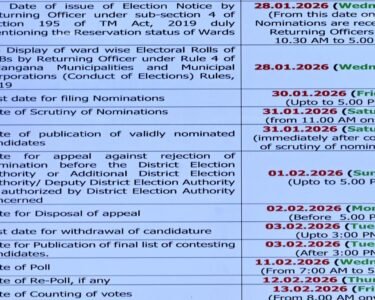In the state of Telangana, public transport and welfare schemes have emerged as key political battlegrounds. The Congress government has announced or promoted welfare measures including free bus travel for women as part of its election guarantees. The scheme is positioned as a women-empowerment tool and a significant vote-bank measure ahead of crucial by-polls and assembly contests.
On the other side, the BRS — which governed Telangana for a decade — is accusing the Congress of making populist promises and failing to deliver on its commitments. The BRS argues that the scheme is being used opportunistically for electoral gain rather than a well-designed and sustainable welfare policy. As one BRS leader put it: “They call it free for women, but the men have to pay twice the charge … so ultimately the cost to a household increases.”
Thus the free-bus scheme has become symbolic: for Congress it is a welfare promise and political lever; for BRS it is critique fodder and a rallying point for protest.
Street Mobilisation: From Protests to Public Engagement
The rivalry is not confined to press releases and legislative debates. The BRS has taken to the streets. For example, the party staged protests when a bus-fare hike was announced by the Congress government. According to reports, the BRS staged a demonstration outside the Bus Bhawan in Hyderabad, accusing the government of breaking its “420 promises” and alleging that the fare hike contradicted the free travel promise.
In these street campaigns, BRS leaders boarded ordinary city buses to highlight the impact of fare increases on everyday commuters, particularly men and households. They portrayed the scheme and the fare hike as connected: while women get “free” rides, the burden shifts to others. This helps the BRS appeal to male voters and households feeling disadvantaged.
On the other side, the Congress is also mobilising on the ground with the free-bus promise: its campaign outreach, especially to women voters, emphasises such welfare measures. For example, prior to the Jubilee Hills by-poll, the party highlighted free bus travel, subsidised gas cylinders, interest-free loans for women, and other welfare pledges.
Thus the campaign has expanded beyond conventional rallies into grievance‐driven street action, media stunts, bus rides, and door-to-door outreach — with the free bus scheme as the core flashpoint.
The Argument: Welfare vs. Weight on the Common Man
From the Congress perspective, the free bus scheme is a progressive step: it reduces mobility cost for women, enhances access to education/employment, and signals gender-sensitive governance. Presenting this as a fulfilment of election promises, Congress urges voters to support the party for inclusive development.
However, the BRS counters that the scheme is not sustainable and is creating hidden burdens. Specifically:
- They argue that while women may travel “free”, fares for men have been increased or fare hikes enacted — meaning households overall may pay more.
- They allege the scheme is primarily politically driven — launched for electorates rather than long-term planning.
- They point to administrative issues: how will transit corporations absorb the revenue shortfall? What happens to men, students, low-income commuters who might face higher fares or reduced services?
There is also debate around implementation: some social commentary notes that free travel schemes, if not carefully structured, can distort resource allocation, reduce revenue for public transport providers, and raise issues of fairness. (For example, a Reddit discussion noted that free travel for one section may lead to higher fares for others).
Thus the BRS frames the scheme not just as a welfare tool but as a political liability for Congress, and uses street mobilisation to underline this point.
Electoral Implications: Focus on By-Polls and Voter Demographics
The timing of these confrontations is no accident. The by-poll in the Jubilee Hills constituency (Hyderabad) has intensified the contest between the two parties. Voting blocs such as women voters are especially targeted, with over 1.91 lakh women voters out of 3.98 lakh electors in that constituency.
Congress is pitching welfare and women-centric schemes, including the free-bus travel, to secure this demographic. BRS, meanwhile, is stressing its decade of governance and charging Congress with failure to deliver. In one speech, the BRS working president framed the by-poll as a comparison between “BRS development” and “Congress failures”.
Moreover, the street protests and fare hikes provide BRS with material for campaigning: every hike or disruption is turned into an example of Congress mis-governance. Thus the free-bus scheme and related transport fare issues are playing out not only in policy space but in electoral mobilization and narrative framing.
Challenges and Outlook: Can the Free-bus Promise Deliver?
Despite the political theatrics, there are real challenges behind the promise of free bus travel:
- Financial sustainability: Who will bear the cost of subsidising fares? Will rail/road transport corporations get adequate compensation?
- Service quality: Free travel might increase demand – will buses be sufficient in number/frequency? Could quality decline?
- Equity issues: If men or certain commuter categories end up paying more or facing reduced service, resentment may build.
- Implementation logistics: Ensuring that only eligible users (women domiciled in the state) avail of free travel, while preventing misuse, requires robust administration.
If the scheme falters in delivery — e.g., overcrowding, fare hikes elsewhere, reduced services — then the BRS narrative of “populist promise” may gain traction. For its part, the Congress must ensure operational roll-out and avoid giving BRS any further ammunition via mis-steps.
Conclusion
The confrontation between BRS and Congress in Telangana over the free-bus scheme is more than just policy disagreement — it is a symbolic and strategic political clash. Congress positions the scheme as a progressive welfare measure, particularly for women, tied into a broader vision of social justice. BRS counters with claims of unsustainability, hidden burdens on households, and electoral opportunism.
On the ground, this is playing out via street protests, bus rides staged by leaders, fare-hike critiques, and campaign mobilisations focused on women and urban commuters. The transport ecosystem has become the theatre of the wider political conflict.
For voters, the key question is whether the promise of free travel translates into reliable service, fair implementation and no adverse effects on others. For both parties, the issue has now migrated from boardrooms to bus stops — making every ride, every fare tab, and every protest a part of the broader electoral narrative.







